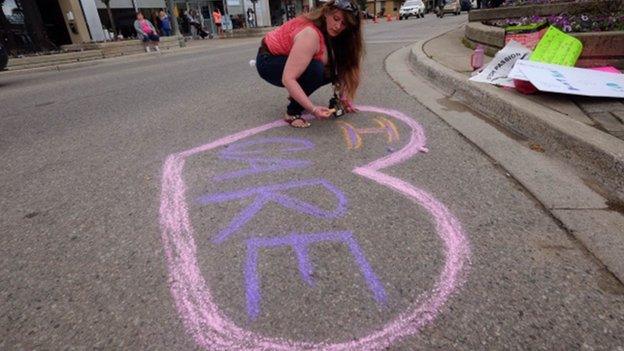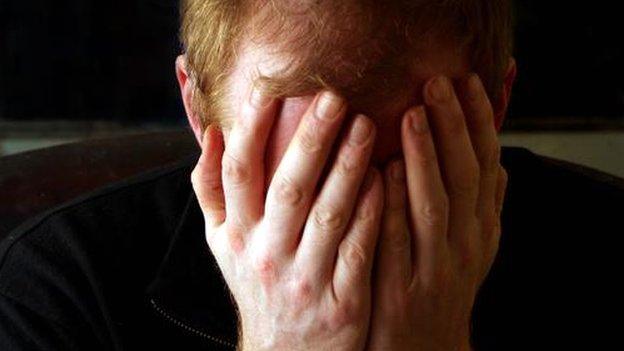Teen suicide on the rise among Canadian girls
- Published

Students held a walkout to protest the suicide crisis in Woodstock, Ontario in 2016.
Suicide among young women is on the rise. When it comes to mental health, is gender the elephant in the room?
In early 2016, five teenagers from Woodstock, Ontario killed themselves in just as many months, leaving not only their family but the community as a whole bewildered with grief.
"Everyone was sitting on edge. For a while there, I think we all just sat there wondering when it was going to end," says Jenilee Ookcay, a community health worker.
Across the country, suicide among teen girls and young women is on the rise, while male suicide in the same age group declines, according to data released by Statistics Canada on Thursday.
Health experts have long been concerned with the prevalence of suicide among young men. It has been called a "silent epidemic" and for good reason. In 2013, men were three times as likely to kill themselves as women, the latest data shows.
But while men are still much more likely to kill themselves in Canada, young women are starting to catch up. Over the past decade, the suicide rate among girls has increased by 38%, while male suicide decreased by 34%.
The growth has helped level out the gender-gap, with women accounting for 42% of all suicide deaths under 20 in 2013. In 2003, they accounted for just over a quarter.
A similar trend can be observed in the United States, external, and in 2014, suicide surpassed maternal mortality as the leading cause of death in girls ages 15-19 in the developing world, according to the World Health Organisation.
A 2012 report by the Public Health Agency of Canada urged researchers to look at why suicide had declined in teen boys since the 1980s, but not in girls. With the government expected to earmark considerable funds for mental health in the next annual budget, due in mid-March, health experts are wondering if Canada needs to rethink the role of gender in suicide prevention.
"It definitely warrants some really dedicated attention to why there has been such an increase, particularly when we are seeing children and youth dying by suicide," says Renee Linklater, director of Aboriginal engagement and outreach at the Centre for Addiction and Mental Health in Toronto.
Dr Linklater says she's been concerned about growing suicide rates among young indigenous women for some time, and limited data suggests they are more vulnerable than non-indigenous girls. Data obtained by the BBC for 2015 shows that indigenous women in Ontario are more likely to kill themselves than non-indigenous women.
Why are people getting semicolon tattoos?
Women made up more than half of all indigenous suicides in 2015 in Ontario, compared with the non-aboriginal population where women made up just one quarter of all suicides. Between 2006 and 2015, the number of female suicides climbed 1.5 times faster in indigenous women than it did for non-indigenous women.
Dr Linklater says we should be paying more attention to this disparity, and the effects that gender and colonialism have on young indigenous women, whom she says experience "double oppression".
Researchers in Canada and abroad are not sure why suicide is rising among young women. Some have suggested it could be because women are using deadlier methods. Others say it might be because coroners are reporting female suicide more.
In Canada, women make three to four times as many suicide attempts as men do. Studies indicate that there is a strong link between a history of sexual abuse and suicide attempts.
Yet gender is rarely discussed when we talk about youth suicide, says Ms Oockay, who works in suicide prevention in Woodstock.
"When we train our community members, if the trends are shifting, we want to know that," she says.
Arielle Sheftall, a researcher at the Center for Suicide Prevention and Research at the Research Institute at Nationwide Children's Hospital in the United States, says that more research is needed into the role that gender and age play in suicide prevalence.

The town of Woodstock joined together after a series of teen suicides in 2016
"Research has shown that the age of puberty is getting younger, and the age of onset for psychiatric disorders especially depression, is highly correlated with the age of puberty," says Ms Sheftall.
Another culprit might be sexism, research into suicide in developing countries suggests. Dr Suzanne Petroni, the senior director for gender, population and development at the International Center for Research on Women, believes that lack of opportunity and rigid gender roles may be to blame for the high rate of young female suicides in developing countries, like India.
"Rampant sexism, harmful gender norms, perceptions of girls not being valued as anything other than a wife and a mother, very likely is contributing to mental-health problems and suicide," she told the BBC.
These harmful stereotypes, or "visions of what they should be, but aren't", have only been amplified by the spread of social media around the globe, Dr Petroni says.
The father of cyberbully victim Rehtaeh Parsons, speaks to the BBC about his grief a year after her death.
Although Woodstock is far from the developing world, this explanation rings true to Ms Ookcay, who teaches suicide prevention.
"Our youth live in a world that the pressure and stress is way different than it ever has been. I see high levels of perfectionism and the need to be on it all the time, and be the best at everything you do," she told the BBC.
In Woodstock, the town is still grieving a year after the suicide crisis. Everyone from hairdressers to school principles have asked how they can help, Ms Ookcay says, and the students themselves are reaching out both to get help and help others.
"I think it could happen anywhere, and it's unfortunate that it happened here," she says.
"But I'm a big picture thinker, and I do think it's about the triumph from the tragedy."
Where to get help
If you are depressed and need to ask for help, there's advice on who to contact at BBC Advice.
From Canada or US: If you're in an emergency, please call 911. If you or someone you know is suffering with mental-health issues, call Kids Help Phone at 1-800-668-6868. If you're in the US, you can text HOME to 741741
From UK: Call Samaritans on 116123 or Childline on 0800 1111
- Published25 May 2016

- Published26 January 2017
